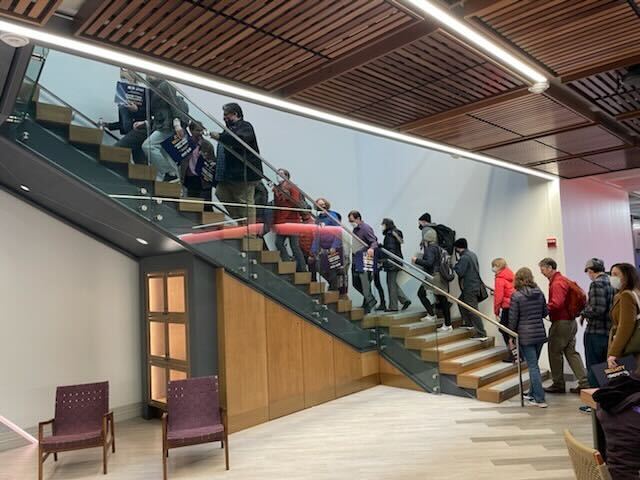Faculty union protests outside bargaining room, talks job security and fair contracts
Image courtesy of Richard Granger
Pitt faculty protest on the steps of Posvar Hall for a fair contract on Thursday afternoon.
October 27, 2022
More than 150 faculty members showed up Thursday, with signs and in song, on the steps of Posvar Hall to demand one thing — a fair contract.
The union chanted, “what do we want … a fair contract … when do we want it … now … and if we don’t get it … shut it down,” as tensions continue to rise between the faculty union and the University due to claims from faculty that the administration is delaying negotiations. On Thursday morning the union’s bargaining committee sat down with the University to attempt to negotiate a contract, this time bringing around 100 fellow union members into the room with them to silently protest the lack of a fair contract.
Melinda Ciccocioppo, a teaching assistant professor of psychology at the University and member of the faculty union, said the University has not taken the faculty union “seriously.”
“We are calling on the University to collaborate meaningfully with our bargaining committee to get us that fair contract,” Ciccocioppo said.
Faculty, which are represented by the United Steelworkers union, marked their landslide victory almost one year ago. However, according to many faculty members, contract negotiations have been slow. Faculty union members at the protest Thursday also complained about slow negotiations, with both sides having yet to agree on a contract.
The University said in a statement that Pitt meets with the union negotiation team “regularly.” The University did not attribute a name to its statement.
“Between meetings, both teams review and prepare proposals so that they are able to come to bargaining sessions prepared for meaningful discussion,” the statement said. “While the process for negotiating a first collective bargaining agreement can be lengthy, the University has been pleased with the progress made so far and will continue to work toward an agreement that reflects shared goals.”
Tyler Bickford, the chair of the bargaining committee for the faculty union, sat in the bargaining meeting on Thursday with the University. While Bickford said he could not discuss the specifics of the meeting, he said the demonstrations by the union today at Posvar Hall seemed to help move the bargaining process along.
“I think the bargaining session today was productive, and we saw that the presence of so many Pitt faculty this morning moved the University’s team to start taking some of these concerns seriously,” Bickford, a professor in the English department, said.
Job security is at the forefront of the union’s demands in their fight for a fair contract, with many of the protesters holding signs stating “job security = emotional well being.” Ciccocioppo said faculty members who are not on the tenure track are required to reapply or renew their contracts in order to continue teaching each year, and the process is “completely unnecessary.”
“Specifically, we are asking for automatic contract renewals for non-tenured faculty members,” Ciccocioppo said. “Two-thirds of the faculty are on short renewable contracts, we have to constantly renew our contracts and we don’t know from one term to the next or one year to the next whether or not we are going to have a job.”
Ciccocioppo also said the University has continued to delay in contract negotiations, and they “want a fair contract now.”
“The reason why we are out here and what we are calling to do is for the University to pick up the pace on bargaining and we want to have a say in that contract, and the University has not been taking us seriously,” Ciccocioppo said.
Peter Bell, a teaching assistant professor of chemistry and a faculty union member, said he is going through the auto-renewal process for his job currently, in a department that he states “is in desperate need of instructors.”
“I put a lot of effort and a lot of energy towards proving that I should still be here for what seems to be an almost automatic process,” Bell said. “Everything that I’ve heard is that I’m doing a good job and that I’m needed in the classroom, and so that process should be flipped so that the expectation is that I will still have a job for the following year.”
When asked if the union has considered striking if delays in bargaining continue, Bell said there is a potential for the union “to walk away from their work.”
“If they’re going to continue to delay, which is the same thing we saw all throughout the process towards the election, delay, delay, delay, we need to make it known to them that we deserve a contract,” Bell said. “If it comes to it, I don’t think any of us want to walk away from our work, but if that’s the pressure that it takes to finally get us [a contract], then that might be what it comes down to.”
The University did not answer questions from The Pitt News about a potential union strike or if auto-renewal contracts will be considered, and did not provide any response to the faculty unions protests outside of the bargaining room on Thursday.
Ciccocioppo said the lack of job security and the delays for a fair contract affect everyone — including students.
“We have to spend our time and energy thinking about and worrying about whether or not we are going to have a job instead of doing that job, Ciccocioppo said. “And this ends up not just affecting faculty, but also this affects students too because students won’t know if they can get letters of [recommendation] or mentors, or if their faculty will even be here when they graduate.”



